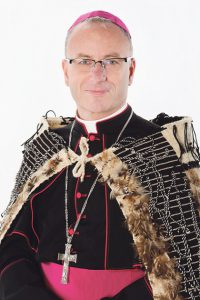‘Our Christian faith belongs to all cultures..'
Published on 1st Jul, 2016
July 2016 | Hōngongoi
News | He Pitopito Kōrero
Bishop Charles Drennan shares the following reflections about Māori language and Catholic Faith.
I think the question of Māori language usage should not be separated from the question of inculturation. Language is an enormously rich symbol of a culture and therefore of a way of thinking. Inculturation is not about translation. It’s about giving expression to already existing Christian insights in a culture. This stems from our belief that Christ is the universal saviour; his incarnation finds resonance in every culture.
The more Te Reo Māori is used in liturgical and ecclesial settings the more present will be Māori insight into the living of our One Catholic Faith. Our Christian faith belongs to all cultures because Christ became one of us. Therefore, we might say that every ‘absence’ of Māori participation in the faith life of our communities is necessarily an impoverishment of the possible expressions of our faith.
It is, I think, worth remembering that the first Catholic missionaries to New Zealand worked among Māori. The first faith communities – iwi whakapono – in Aotearoa New Zealand obviously were all Māori. In this sense our Catholic Māori communities are at the heart of the New Zealand Church not on the periphery.
This year’s O’Shea Shield Competition, at which Māori students are becoming increasingly prevalent, raised important questions about the framework of events. Young Māori are inviting us all to reflect on what a bi-cultural framework might look like for such a programme. What does this mean? I’m not exactly sure but what I am becoming increasingly aware of is that we want to get beyond ‘tacking on Māori bits’ as though that were enough.
Faith and Inculturation
The following paragraphs are from the Vatican’s International Theological Commission’s 1988 document on Faith and Inculturation.
‘The International Theological Commission has had, on several occasions, the opportunity to reflect on the relationship between faith and culture. In 1984 it spoke directly on the inculturation of faith in its study on the mystery of the Church, which it produced with a view to the extraordinary synod of 1985. For its part, the Pontifical Biblical Commission held its 1979 plenary session on the theme of the inculturation of faith in the light of Scripture. [1]
Today the International Theological Commission intends to continue this reflection in a more profound and systematic manner on account of the importance assumed by this theme of the inculturation of faith throughout the Christian world and on account of the insistence with which the Church’s magisterium has considered this theme since the Second Vatican Council. [2]
Pope John Paul II himself has taken to heart in a special manner the evangelisation of cultures: In his view, the dialogue of the Church and of cultures assumes a vital importance for the future of the Church and of the world. To assist him in this great work, the Holy Father has created a specialised curial body: the Pontifical Council for Culture. [4]
Relying on the conviction that “the incarnation of the Word was also a cultural incarnation”, the pope affirms that cultures, analogically comparable to the humanity of Christ in whatever good they possess, may play a positive role of mediation in the expression and extension of the Christian faith. [5]
The Vatican’s International Theological Commission document on Faith and Inculturation (1988) can be found on the Vatican website (tinyurl.com/faith-and-inculturation).
Bishops Issue Letter on Occasion of Royal Commission Apology
Bishop
Published on 20th Nov, 2024
Earlier this week, we bishops gathered together and listened as the Prime Minister apologised to [..]
Truly listening to others
Bishop
Published on 5th Oct, 2024
I write this editorial comment to you from Rome [in September] where, along with Bishop Richard [..]
NZ’s ‘baby bishops’ attend bishops’ school in Rome
Bishop
Published on 5th Oct, 2024
Two New Zealand bishops, Richard Laurenson and John Adams, attended the Baby Bishops course in Rome [..]
Remembering St John Paul II’s inspiring evangelisation
Bishop
Published on 13th Aug, 2024
Pope Francis is often quoted as having said, as a Catholic community, we are less living in an era [..]
Remembering St John Paul II’s inspiring evangelisation
Bishop
Published on 3rd Aug, 2024
Pope Francis is often quoted as having said, as a Catholic community, we are less living in an era [..]

